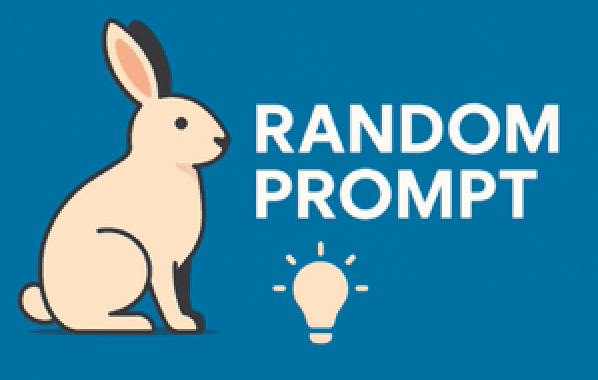There is lots of advice about prompts for AI.
They all sound reasonable and linear.
As a result Generative AI such as ChatGPT will respond in a logical way.
But are we missing a bigger opportunity to unlock the creativity of AI using Random Prompts?
In a world obsessed with strategy, structure, and step-by-step plans, randomness can feel… irrelevant.
Or even wasteful, certainly inefficient.
But what if I told you that random prompts might be one of the most undervalued, untapped tools for unlocking creativity — especially in the age of AI?
This is one of the key insights of Dr Edward de Bono.
You need a random provocation to escape from your existing patterns.
It works for humans, why not AI?
Random prompts may look like play, but they’re serious cognitive catalysts.
Random Prompts Open the Door to Your Amazing Mind
If you’ve ever been stuck on a problem, trying to “think harder” rarely helps.
You’re trapped in what i call Box Mode — the structured, logical, efficient part of your brain (the Central Executive Network).
Box Mode is great for order.
But not for leaps.
Now imagine this:
You’re trying to get more people to the cinema.
You ask for a random word.
AI says: “Rabbit.”
Your brain lights up.
What does a rabbit have to do with the cinema?
And that’s the moment — the switch.
Your Default Mode Network (DMN) kicks in, retrieving memories, stories, metaphors, possibilities.
- “What if cinema night was like a rabbit hole — mysterious, surprising, immersive?”
- “Could we partner with a petting zoo or use soft textures to enhance the sensory experience?”
- “Rabbits = fast, unexpected. Could we run pop-up flash screenings announced only hours before?”
Suddenly, you’re not just thinking harder — you’re thinking differently.
That’s the power of a random prompt.
The Brain Science Behind Random Prompts
Here’s what’s happening neurologically:
- The random prompt bypasses your default mental filters.
- It activates the DMN, where imagination, intuition, and novelty thrive.
- Your Salience Network — the brain’s internal spotlight — jumps in to connect the randomness to your real-world challenge.
- You switch modes, and your brain builds new links.
This is what I call an Everyday Moment of Genius — small, spontaneous, and often surprising.
Why AI Makes This Even More Powerful
AI is particularly good at generating randomness at scale — across domains, metaphors, time periods, or emotional tones. You could ask:
- “Give me a random word related to nature.”
- “What’s an unlikely object that could inspire a marketing idea?”
- “Offer a strange image for a team challenge.”
AI responds instantly. But here’s the twist:
It’s not the prompt that holds the genius.
It’s the human act of connecting it to something meaningful.
That’s the duet.
You’re not just receiving — you’re co-creating.
I call this the Switch–Prompt–AI Loop.
- Switch your thinking. Step out of default logic.
- Prompt the system. Invite something random.
- Collaborate with AI. Use the prompt to stretch.
- Connect it back to your purpose or challenge.
- Create something new — in 2 minutes or less.
It’s fast. Frictionless. And surprisingly fun.
Random Is Not Pointless — It’s Potential
One of the biggest myths in problem-solving is that we must stay focused and rational.
But sometimes, the quickest route to innovation is an intentional detour.
Random prompts:
- Invite curiosity instead of control.
- Remove the pressure of being clever.
- Turn thinking into a game — which is exactly when the best ideas show up.
- Help everyone participate — not just the loudest or most logical.
They are democratic and dynamic.
Small Switches, Big Results
I’ve seen this work with executive teams, schoolteachers, marketers, and parents.
When stuck on:
- A career decision → Random word: “Lighthouse”
- A team conflict → Random word: “Glue”
- A new product → Random word: “Origami”
Each prompt unlocks something.
Not because the word is magic — but because your mind is.
You’re already wired for this. Random prompts simply remind you of your potential. They give your brain permission to make leaps — and Switch Thinking gives you a structure to land those leaps.
Final Thought: Reclaim the Magic
We often wait for holidays, retreats, or “deep work days” to think differently.
But what if you could trigger a creative switch in 2 minutes using just a prompt and your own mind?
Randomness is not the enemy of productivity — it’s the birthplace of insight.
So the next time you’re stuck, ask for something strange.
Then switch, connect, and create.
That’s your everyday genius waiting to emerge.

